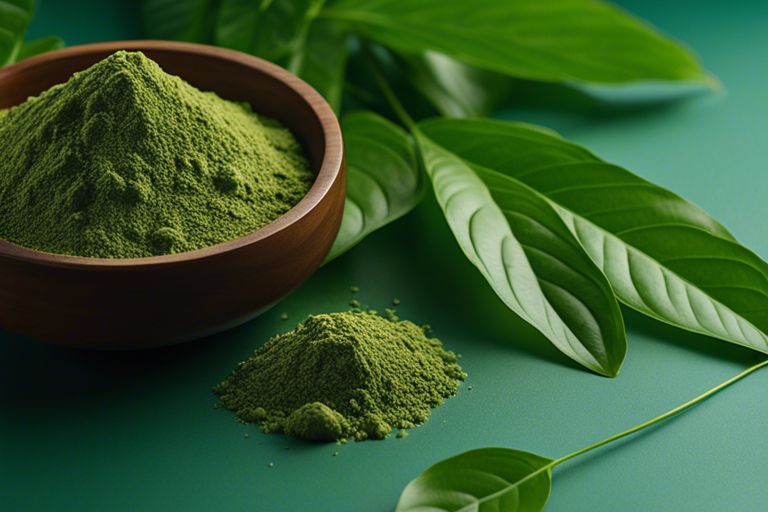Deprecated: mb_convert_encoding(): Handling HTML entities via mbstring is deprecated; use htmlspecialchars, htmlentities, or mb_encode_numericentity/mb_decode_numericentity instead in /home/users/kratomfiles/www/kratomfiles.com/wp-content/plugins/quick-adsense-reloaded/includes/template-functions.php on line 3552
Imagine your body as a finely-tuned machine, with each organ working in harmony to keep you running smoothly. But what if there was a substance that could throw a wrench into this delicate balance? Enter kratom, a plant native to Southeast Asia that has gained popularity for its recreational use. However, recent studies have raised concerns about the potential impact of kratom on kidney health. A single case study has shed light on the possible link between kratom use and kidney damage. This revelation begs the question: what exactly is happening within the kidneys when kratom is consumed, and what are the potential risks we should be aware of?
Overview of Kratom's Effects on Kidneys
Kratom's effects on the kidneys have been a subject of concern due to reported cases of unexplained hyperkalemia and the limited data available on its impact on potassium homeostasis and renal excretion. It is important to understand the potential effects of kratom use on kidney health, as kidneys play a crucial role in maintaining overall health and well-being.
Scientific evidence regarding kratom's effects on the kidneys is still in its early stages, and more research is needed to fully understand the potential risks. However, a reported case associating kratom with hyperkalemia, a condition characterized by high levels of potassium in the blood, raises concerns about the potential for kidney damage.
One study found that kratom can block hERG potassium channels in cultured bovine cells, which suggests a potential mechanism for its impact on kidney function. This blocking effect may disrupt potassium homeostasis, leading to hyperkalemia and potential kidney damage.
Given the limited data available, it is essential to approach kratom use with caution. If you are considering using kratom, it is important to be aware of the potential risks and monitor your kidney function regularly. It is also crucial to inform your healthcare provider about your kratom use to ensure proper monitoring and management of your kidney health.
Research on Kratom and Kidney Function
Limited research has been conducted on the effects of kratom on kidney function, highlighting the need for further investigation into this area. While there is still much to learn about the potential impact of kratom on the kidneys, a few key findings have emerged from the available studies:
- First reported case: A study presented the first reported case linking kratom use with hyperkalemia, a condition characterized by high levels of potassium in the blood. This suggests that kratom may have kidney-related effects that warrant further exploration.
- Potassium regulation: Understanding the mechanism behind kratom-induced hyperkalemia could deepen our knowledge of renal potassium regulation. This research could provide valuable insights into how kratom affects kidney function and potentially inform treatment approaches.
- Kidney injury: Findings suggest that regular kratom use may be associated with kidney injury. This underscores the importance of investigating kratom's impact on renal function and the potential health problems it may pose to users.
- Urgent need: The increasing use of kratom calls for monitoring and potential regulation to safeguard kidney health. With limited research available, it is crucial to conduct further studies to fully understand the effects of kratom on kidney function.
Kratom, a substance used for centuries in Southeast Asia and New Guinea, has gained popularity in recent years, especially for its purported pain-relieving and mood-enhancing properties. However, its potential effects on kidney function remain understudied. By conducting more research, we can gain a better understanding of the risks and benefits associated with kratom use, particularly in relation to kidney health. This knowledge can help inform individuals considering kratom use and guide healthcare professionals in providing appropriate care and guidance.
Potential Risks of Kratom for Kidney Health

Using kratom may pose potential risks to kidney health, as research suggests a link between kratom use and hyperkalemia, a condition characterized by high levels of potassium in the blood. One case study reported unexplained hyperkalemia in a patient using kratom for recreational purposes, indicating a possible association between kratom use and kidney damage. However, there is limited data on kratom's effects on potassium homeostasis and renal excretion, highlighting the need for further research on its impact on kidney health.
Studies have shown that kratom can block hERG potassium channels, which are responsible for regulating potassium levels in the body. This raises concerns about the potential impact of kratom on kidney function and its ability to disrupt potassium regulation. Furthermore, kratom-induced hyperkalemia can be critical and life-threatening, emphasizing the importance of monitoring and understanding its mechanism and effects on kidney health.
In addition to hyperkalemia, kratom use has been linked to changes in urinary protein profiles, indicating possible kidney injury. This further underscores the need to understand the potential risks associated with kratom use and its impact on renal function.
Considering these potential risks, it is important for individuals who use kratom to be aware of the potential harm it can cause to their kidneys. Monitoring kidney health and seeking medical advice when necessary is crucial, especially for those who regularly consume kratom.
Symptoms of Kidney Damage From Kratom Use
If you experience kidney pain or discomfort in the flank region, it could be a potential symptom of kidney damage from kratom use. It's important to be aware of the symptoms of kidney damage as a kratom user, as prompt recognition and intervention can help prevent further complications. Here are some common symptoms that may indicate kidney damage from kratom use:
- Changes in urination patterns: Pay attention to any increase or decrease in urination frequency. This could be a sign of kidney damage and should not be ignored.
- Swelling in the legs, ankles, or feet: Fluid retention can occur as a result of kidney damage caused by kratom use. If you notice swelling in these areas, it's important to seek medical attention.
- Fatigue, weakness, or difficulty concentrating: Kidney damage can lead to a decrease in the production of erythropoietin, a hormone responsible for red blood cell production. This can result in symptoms such as fatigue, weakness, and difficulty concentrating.
- Nausea, vomiting, or loss of appetite: Kidney damage can affect the body's ability to eliminate toxins, leading to symptoms like nausea, vomiting, and loss of appetite.
- Unexplained weight loss: If you're experiencing kidney damage from kratom use, you may notice unexplained weight loss. This can be a result of decreased appetite, fluid loss, or other factors related to kidney dysfunction.
It's important to remember that these symptoms may not be exclusive to kidney damage from kratom use. They can also be caused by other factors or medical conditions. If you're experiencing any of these symptoms, it's crucial to consult a healthcare professional for an accurate diagnosis and appropriate treatment.
Can Kratom Use Lead to Kidney Damage and Hyperpigmentation?
Recent studies have shown that kratom hyperpigmentation causes may include kidney damage and skin discoloration. Long-term use of kratom has been linked to renal toxicity, leading to kidney dysfunction. Additionally, some users have reported experiencing hyperpigmentation, causing dark patches on the skin. It is important to be aware of these potential health risks associated with kratom usage.
Treatment and Prevention of Kidney Damage Related to Kratom

To effectively treat and prevent kidney damage related to kratom, it is important to follow certain measures and recommendations. If you suspect kidney damage from kratom use, it is crucial to seek medical attention. Consulting a healthcare professional will ensure proper evaluation and treatment. Additionally, staying well-hydrated is essential to support kidney function. Regular check-ups can help monitor kidney health and detect any potential issues early on.
Avoiding kratom use altogether is a key preventive measure. Discontinuing consumption of kratom can help prevent further potential kidney damage. It is also important to maintain a balanced diet to support overall kidney health and function. A nutritious diet consisting of fruits, vegetables, whole grains, and lean proteins can contribute to optimal kidney function.
If kidney damage is confirmed, it is important to follow the recommendations of your healthcare provider for managing and treating kidney-related issues. This may involve supportive care such as medication, dietary changes, or lifestyle modifications.
To summarize the treatment and prevention measures for kidney damage related to kratom, refer to the table below:
| Measures and Recommendations |
|---|
| Seek medical attention |
| Stay well-hydrated |
| Avoid kratom use |
| Maintain a balanced diet |
| Follow healthcare provider's recommendations |
Frequently Asked Questions
What Are the First Signs of Kidney Problems?
The first signs of kidney problems can vary, but common symptoms include changes in urination patterns like increased frequency or difficulty, fatigue, weakness, difficulty concentrating, and swelling in the ankles, legs, or around the eyes. It's important to get regular kidney function tests to catch early indicators of kidney damage. Making lifestyle changes, such as maintaining a healthy diet and staying hydrated, can improve kidney health. Avoiding certain medications and incorporating natural remedies can also support kidney function. Understanding the stages of kidney disease is crucial for managing and treating the condition.
How Do I Know if I Injured My Kidney?
If you injured your kidney, you may experience symptoms like kidney pain, blood in urine, frequent urination, fatigue and weakness, swelling in legs and ankles, high blood pressure, changes in urine color, loss of appetite, and nausea and vomiting. It's important to pay attention to these signs and seek medical attention if they persist or worsen. Remember to take care of your kidney health by staying hydrated, maintaining a healthy lifestyle, and discussing any concerns with a healthcare professional.
Does Kratom Affect Creatinine Levels?
If you're wondering about the effects of kratom on creatinine levels, it's important to consider the long-term impacts of kratom use. Research on kratom's impact on kidney function is limited, but there is evidence suggesting a potential connection. Factors such as dosage and individual susceptibility may contribute to kidney damage from kratom use. To manage kidney health while using kratom, it's crucial to monitor renal function tests regularly. If you have kidney damage, it may be wise to explore alternatives to kratom that are safer for your kidneys.
How Can I Rebuild My Kidney Function?
To rebuild your kidney function, there are several natural remedies and lifestyle changes you can try. Start by adopting a kidney-friendly diet that includes foods like leafy greens and berries. Stay hydrated by drinking plenty of water. Consider incorporating kidney supplements and detoxifying your body. Follow medical advice and monitor your blood pressure. Remember, rebuilding kidney function takes time, so be patient and consistent with your efforts.










